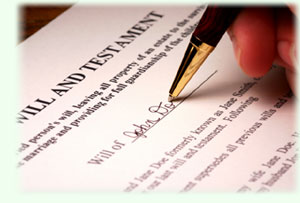 When There’s a Will, When There’s a Will,
There’s a Way
If you are like just over half of American adults, you don’t have a will. Yes, you know you should, but it never seems the right time to write one. And really, how do you do it? Learn the basics of why and how to have a will – information that just may motivate you to create this very important and powerful document.
What It Is
A will is no more than a set of instructions for what you want to have happen with your property and children after you die. It can be as simple as a handwritten, unwitnessed note (legal in about 25 states, as long as it is written and signed in the will-maker’s handwriting), or as formal as a document created by a lawyer.
Why Have One
There are many reasons to have a will:
-
To distribute property. If you don’t have one, the state will decide what happens to your assets. Can you count on the court to make the same decisions you would? Probably not. Typically everything goes to your spouse and/or children. Next in line are your closest relatives. If you have no relatives, your entire estate will be absorbed by the state.
-
To plan for your children. With a will, you choose who will take care of your children who are too young to be on their own. Without your wishes being known, the court will make this extremely personal choice for you – meaning someone who you would never choose for the job could end up raising your children.
-
To minimize probate. Probate is the administrative and court process that takes place after you die. It includes proving the validity of a will (if one exists) identifying, inventorying, and appraising property, paying debts and taxes, and then distributing whatever assets remain. Make no mistake – without a will, probate can be a long and costly process.
-
To make a hard time easier for your loved ones. If you die without a will (or any other estate-planning device) your loved ones will have to make a lot of difficult decisions at the worst time possible: while they are grieving.
How To Do It
If your financial circumstances and wishes are simple, you may choose to write your own will. If this option appeals to you, use a quality software program or guidebook to help do it right. For more complex situations, or if you do not feel comfortable writing your own will, hire an attorney or legal service to do it for you.
Whether you do it yourself or employ help, all of the decisions are yours to make. These include who will be the will’s executer (the person who oversees and manages your estate), what property you want included, and who the heirs will be. If you have children, you’ll need to choose a person to be their guardian as well as someone who will manage any assets you leave them.
You have worked hard to acquire all of your assets, and your children should be raised according to your wishes, not the state’s. If you want to have a say in what happens to your property and dependants after you die, and help your loved ones during a very difficult time, you can. When there’s a will, there’s a way.
|

 When There’s a Will,
When There’s a Will,